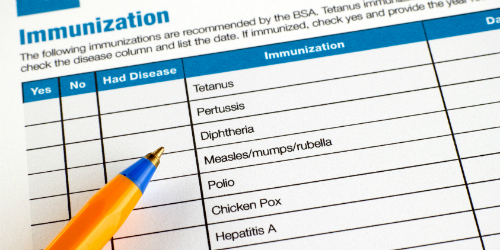Vaccinations

There are some professions that have a higher than normal risk of exposure to infectious disease. Infectious diseases are most frequently transmitted by direct contact with an infected person. Healthcare is a profession with elevated risk for exposure. However, non-healthcare workers can also be at risk. Development of effective vaccine and immunization programs has greatly reduced the spread and prevalence of these diseases.
Vaccines are available for many different diseases. Most people received some vaccines as children. Boosters or titer checks may be required for workers who have previously been vaccinated but routinely come in contact with diseases such as chickenpox, flu, or measles. Other vaccines for less common diseases may be recommended for workers who occasionally come in contact with an infected individual, or infected materials.
An infection can be acquired either by physical contact with the carrier, or by handling infected materials such as blood or other bodily fluids. Hepatitis B virus (HBV) is one of the diseases that can be present in blood or infected bodily fluids. As part of OSHA’s Bloodborne Pathogens standard, employers are required to offer a vaccine for Hepatitis B to any employee who handles, or may be exposed to, blood or blood products. This could include healthcare workers, sanitation, laboratory, fire, or law enforcement personnel. Hepatitis C virus (HCV) and HIV are also specifically mentioned in the standard.
Exposure to other viruses or diseases can be job-related but are not bloodborne. These can include measles, mumps, and whooping cough.
A virus that is not usually associated with human to human transmission is rabies. Rabies occurs in wild animals such as raccoons, squirrels, skunks, or bats. It can be transmitted to other animals, dogs and cats, or humans through a bite. Workers who come in contact with wild animals or infected domestic animals are at risk and should be offered rabies vaccine.
To get more information on the applicability of the vaccination program for a specific County operation please contact the corresponding departmental Safety Coordinator.
For further information on specific regulatory guidelines please refer to the link(s) below:
Bloodborne Pathogens (Cal-OSHA)
Bloodborne Pathogens (OSHA)
Hepatitis B Declination (OSHA)
Hepatitis B Declination Form (PDF: 65 kB)
Vaccines (USDept. of Health & Human Services)